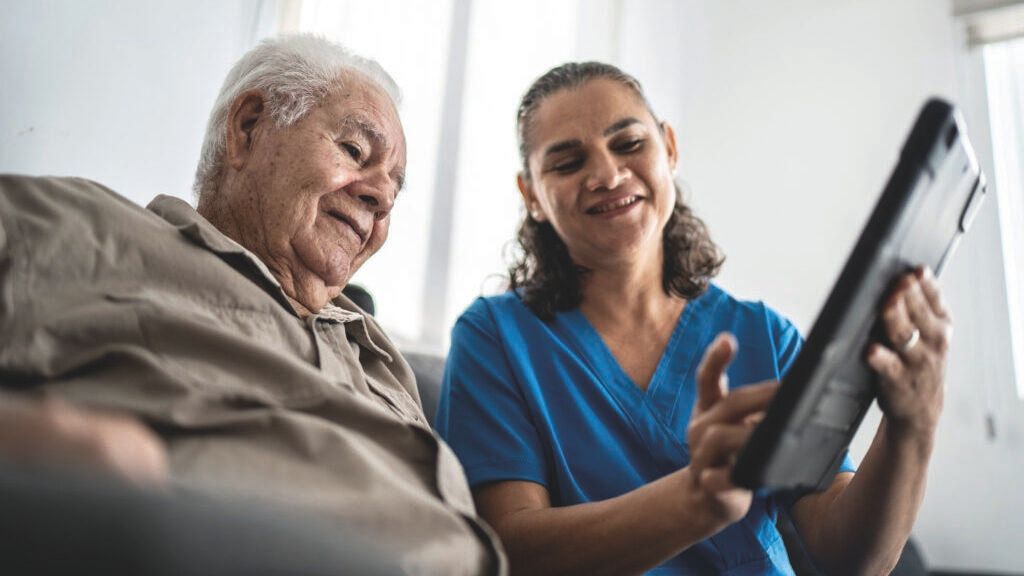OPINION: How digital care planning is putting the ‘social’ back into social care
Rob Martin, managing director of care services at Anchor, England’s largest not-for-profit provider of care and housing for people in later life, explains the benefits of digital social care planning.

We can talk about change in terms of evolution and revolution, and digital technology has been a revolution for industries across the board – arguably, none more so than social care.
When you dig deeper into this revolution, one of the key ways digital care planning is changing the face of social care is through its ability to bring the ‘personal’ back to care.
We know the incredible people that make up our industry are passionate about their jobs because they truly care. I’ve experienced this personally, having started my career in care as a registered manager after serving in the Royal Artillery for almost seven years.
Rolling out a digital care planning programme enables carers to spend more time doing the part of the job they love the most – building relationships with residents and providing exceptional face-to-face support that helps them live life to the full.
Moving to a digital system and capturing information in real-time, as opposed to filling out paperwork after the event, not only unlocks more time for person-centric care, but also the ability to build a deeper understanding of residents, with this knowledge being readily available for all team members. We can instantly access and log their likes, dislikes, wellbeing, what’s going well and what hasn’t been so successful, as well as the health-related details, so that we can create a stronger connection with our residents.
Having access to this vital information at the touch of a button makes social care seamless, eases the burden on colleagues, and ensures targeted care for those who need it. By implementing electronic administration systems, medical records can be updated, accessed and shared efficiently. In doing so, the risk of human error is minimised and the inefficiencies associated with paper-based systems are effectively reduced.
Remote monitoring tools and wearable technology can also be used to detect noise levels, alert colleagues, and monitor a patient’s health data in real-time. Vital signs like heart rate, sleep patterns and mobility can be continuously monitored and flagged for any concerning changes. These technologies can even identify patterns and trends in a person’s health, which could help predict future requirements and allow carers to put in preventative measures, particularly when it comes to things like falls prevention, monitoring dementia symptoms and maintaining dignity with less intrusive care throughout the night.
Crucially, embracing technology in social care locations will strengthen relationships with hospitals and GPs, as well as with loved ones.
By being able to use tech with the resident’s consent, loved ones can access real-time information and stay informed about how they’re doing. The beauty of this is that face-to-face visits then don’t need to include extensive time getting an update from a carer but can provide more quality time with their loved ones.
At Anchor, we’ve seen a transformational change by moving from an analogue approach to digital – both for residents and colleagues. Our revolutionary digital care planning project enables colleagues to capture key information more quickly and efficiently on handheld devices at the time of delivering care to residents. This ensures much more detailed information on residents and their wellbeing is recorded to further enhance quality of care.
It’s also enables us to see trends in the organisation on a micro and macro level as we can capture a much richer level of data than ever before. We have a clearer oversight of what’s working on a broader scale across the organisation and can adapt accordingly.
Another benefit is that it’s more environmentally friendly as it significantly reduces the amount of physical paperwork.
We’re at the beginning of what will be truly possible with digital innovation in social care. As tech in care continues to evolve, the potential applications are boundless. By adopting the right technology, the sector can enhance accessibility, improve communication and offer personalised, data-driven care.
Digital technology is not simply a tool for improvement in the social care sector, it’s a pathway to transformation. I’m certainly excited to be part of that journey and to see where it takes us.




